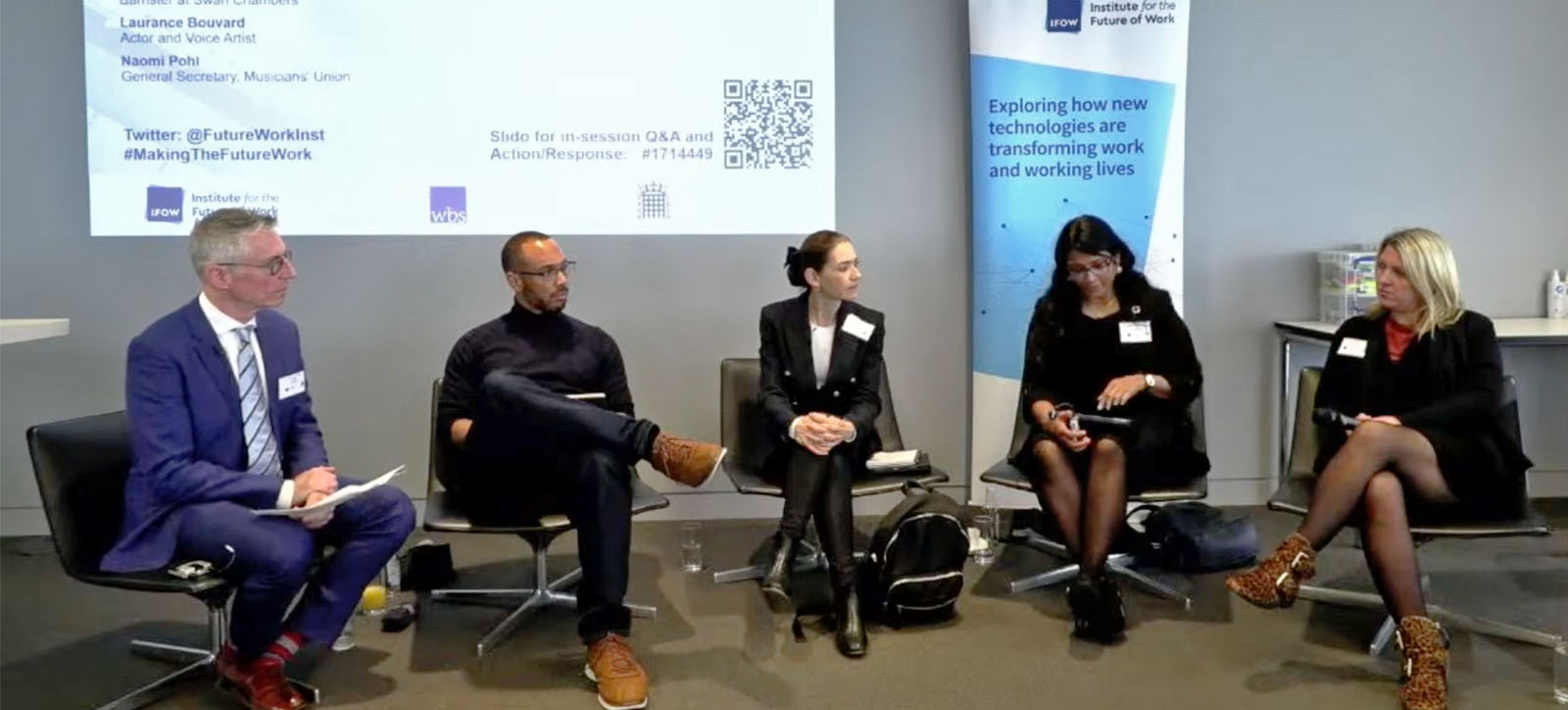
On AI alert: (l-r) Moderator Mike Katell, of the Alan Turing Institute, actor and computer scientist Laurence Bouvard, Linden Walcott-Burton, Culture Policy Officer at Greater London Authority, Shobana Iyer, Barrister at Swan Chambers, and Naomi Pohl, General Secretary, Musicians' Union
Policymakers and business leaders heard how governments need to act now on regulating AI at an official fringe event for the global AI Safety Summit held at WBS London at The Shard.
As governments and global leaders gathered at Bletchley Park for the AI Safety Summit, hosted by UK Prime Minister Rishi Sunak, WBS hosted the Institute for the Future of Work’s (IFOW) fringe event Making the Future Work. While at Bletchley Park the focus was very much on ‘extinction risks’ in the far future, at The Shard, researchers and policymakers discussed more immediate risks to jobs, health and wellbeing created by AI adoption today.
At WBS London ground-breaking research from Warwick Business School set the agenda for discussions with presentations ranging from regulation, to how AI will impact the creative industries and healthcare.
James Hayton, Professor of Innovation and Entrepreneurship and part of the IFOW, led the research entitled What drives UK firms to adopt AI and robotics, and what are the consequences for jobs? and believes with the rapid adoption of AI by big and small firms the time for action by governments is now.
“We are at a critical juncture,” said Professor Hayton. “The outcome of this technological transformation is not yet determined and a future where innovation and social good advance together is achievable.
“Our study suggests that urgent action is required because the scope and pace of automation is now so great across firms of different size.
“Policymakers need to pay attention since existing regional inequalities in technology infrastructure and workforce development can exacerbate economic inequalities and access to good work in the future.
“Policy is needed which promotes an approach to automation that augments rather than substitutes human capabilities, creates new jobs, and enhances access to quality work.”
The fringe event heard talks and discussions from the likes of Sana Khareghani, former Head of the UK Government Office for AI, Rebecca Thomas, Head of Employment Policy at the Equality and Human Rights Commission, and Florian Ostmann, Head of AI Governance and Regulatory Innovation at the Alan Turing Institute.
Abigail Gilbert, Director of Praxis at the IFOW, said: “Professor Hayton’s recent ground-breaking report on the adoption of AI among UK firms provided the context for the opening panel discussion that framed the rest of the day – and the focus for the ‘fireside chat’ with Chloe Smith MP, former Secretary of State in the Department for Science, Innovation and Technology.
“We were pleased to push workplace impacts and immediate risks to workers’ rights right up the Summit agenda and that the direction of conversations at the UK Government’s meeting in Bletchley reflected this, with a far greater emphasis on work and people’s experience of it.
“We are hugely grateful to WBS for hosting us at The Shard – a perfect space looking out over a busy city where AI and automation technologies are transforming working lives.”
The audience heard how AI is already having a huge impact with algorithmic management and automation systems already changing work – and the experience of it – for people right now.
Anna Thomas, Director and Co-Founder of the IFOW, believes the issues faced by workplaces and sectors across the world are real and immediate, and the time society has to start addressing these topics is limited.
She said: “Leading on the Future of Work for the AI Summit Fringe, we had a sell-out attendance and a stellar line-up of contributors, from leading academics and strategists across public and private sector organisations, to frontline workers experiencing most closely the impacts of AI and automation.
“Having the support of WBS to put on our Making the Future Work conference was invaluable to making it such a successful day.”
James Hayton is Professor of Innovation and Entrepreneurship and Pro Dean, External Affairs. He teaches Innovation and Strategic Entrepreneurship on the Executive MBA (London), Executive MBA, Global Online MBA (London) and Global Online MBA.
Learn more about AI with the four-day Postgraduate Award in Business Impacts of Artificial Intelligence.
Or join the Warwick Executive Diploma in Digital Leadership to boost your AI knowledge.
For more articles on the Future of Work sign up to the Core Insights newsletter here.




 X
X Facebook
Facebook LinkedIn
LinkedIn YouTube
YouTube Instagram
Instagram Tiktok
Tiktok